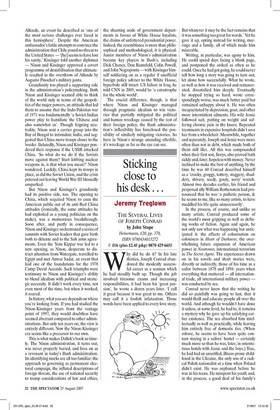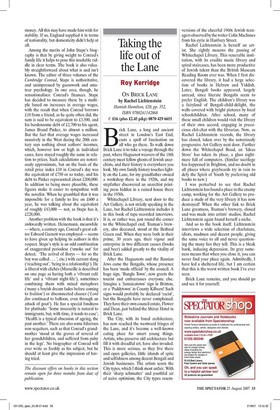Sticking close to his desk . . .
Jeremy Treglown THE SEVERAL LIVES OF JOSEPH CONRAD by John Stape Heinemann, £20, pp. 378, ISBN 9780434013272 £16 (plus £2.45 p&p) 0870 429 6655 Why did he do it? In his late thirties, Joseph Conrad abandoned the modestly successful career as a seaman which he had steadily built up. Though the job involved tiresome exams and increasing responsibilities, it had been his 'great passion', he wrote a dozen years later. 'I call it great because it was great to me. Others may call it a foolish infatuation. Those words have been applied to every love story.
But whatever it may be the fact remains that it was something too great for words.' Yet he gave it up, opting instead for writing, marriage and a family, all of which made him miserable.
Writing, in particular, was agony to him He could spend days facing a blank page, and postponed the ordeal as often as he could. Once he had got going, he could never tell how long a story was going to turn out, let alone how successfully. What he wrote, as well as how it was received and remunerated, dissatisfied him deeply. Eventually he stopped trying so hard, wrote correspondingly worse, was much better paid but remained unhappy about it. He was often incapacitated by depression, gout, and other more intermittent ailments. His wife Jessie followed suit, putting on weight and suffering chronic pain in the knees. Repeated treatments in expensive hospitals didn't save her from a wheelchair. Meanwhile, together and separately, Joseph and Jessie were more often than not in debt, which made both of them still iller. All this was compounded when their first son, Borys, also proved both sickly and, later, hopeless with money. Never inclined to make the best of anything, by the time he was 60 Conrad described himself as a `crocky, groggy, tottery, staggery, shuddery, shivery, seedy, gouty, sorry' wretch. Almost two decades earlier, his friend and perpetual ally William Rothenstein had pronounced that he was 'a pathetic person, & he seems to me, like so many artists, to have muddled his life quite unnecessarily'.
In the process, of course, and unlike so many artists, Conrad produced some of the world's most gripping as well as defining works of fiction. Again and again, he not only saw what was happening but anticipated it: the effects of colonisation on colonisers in Heart of Darkness; the overwhelming future expansion of American power in Nostromo; international terrorism in The Secret Agent. The experiences drawn on in his novels and short stories were, directly or indirectly, those of his time as a sailor between 1878 and 1894: years when everything that mattered — all international trade, all international military power — was conducted by sea.
Conrad never knew that the writing he did so painfully was going to last, that it would thrill and educate people all over the world. And athough he wouldn't have done it unless, at some level, he had to, it remains a mystery why he gave up his satisfying earlier existence. The sea absorbed him intellectually as well as practically, while leaving him entirely free of domestic ties. (When ashore, he seems to have been quite content staying in a sailors' hostel — certainly much more so than he was, later, in ostentatious hotels with Jessie and the boys.) True, he had had an unsettled, illness-prone childhood in the Ukraine, the only son of a radical Polish nationalist at a time when Poland didn't exist. He was orphaned before he was in his teens. He misspent his youth and, in the process, a good deal of his family's money. All this may have made him wish for stability. If so, England supplied it in terms of nationality, but domesticity didn't help at all.
Among the merits of John Stape's biography is that by giving weight to Conrad's family life it helps to pose this insoluble riddle in clear terms. The book is also valuably straightforward about what is and isn't known. The editor of three volumes of the Cambridge Conrad, Stape is authoritative, and unimpressed by guesswork and amateur psychology. In one area, though, he sensationalises: Conrad's finances. Stape has decided to measure these by a multiple based on increases in average wages, with the result that when Conrad borrows £10 from a friend, as he quite often did, the sum is said to be equivalent to £3,500, and his burdensome debt of £2,700 to his agent, James Brand Pinker, to almost a million But the fact that average wages increased massively in the West during the 20th century says nothing about authors' incomes, which, however low or high in individual cases, have stayed roughly the same in relation to prices. Such calculations are notoriously approximate, but on the basis of the retail price index £10 in Conrad's day was the equivalent of £750 or so today, and his debt to Pinker represented about £200,000. In addition to being more plausible, these figures make it easier to sympathise with the novelist. When he grumbled that it was impossible for a family to live on £600 a year, he was talking about the equivalent of roughly £43,000 — not, as Stape has it, £228,000.
Another problem with the book is that it's awkwardly written. Heinemann, meanwhile — where, a century ago, Conrad's great editor Edward Garnett was employed — seems to have given up helping its authors in this respect. Stape's style is an odd combination of exaggerated periodese (smoke out' for detect; 'The arrival of Borys — for so the boy was called. ', etc.) with current slang (reaching out', 'being in a relationship'). He is liberal with clichés (Marseille is described on one page as having both a 'vibrant café life' and a 'vibrant night-life'), sometimes combining them with mixed metaphors (many a boyish dream fades before coming to fruition') or disconnected clauses (Lord Jim continued to balloon, even through an attack of gout'). He has a special fondness for platitude: 'Some insecurity is natural to immigrants, but, with time, it tends to ease'; 'Health is a typical obsession of ageing, the past another.' There are also some hilarious non-sequiturs, such as that Conrad's grandmother 'stood at the graves of several of her grandchildren, and suffered from palsy in the legs'. No biographer of Conrad will ever write as freshly as his subject, but he should at least give the impression of having tried.
The discount offers on books in this section remain open for three months from date of publication.










































 Previous page
Previous page